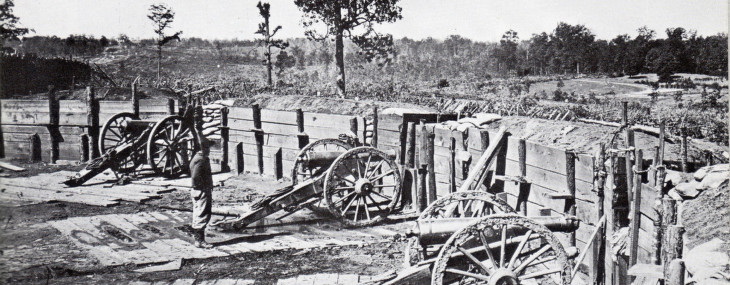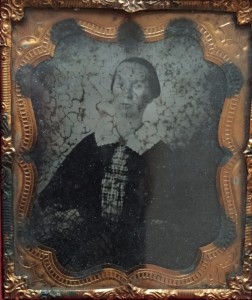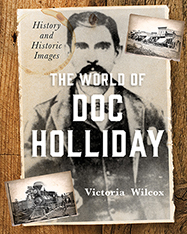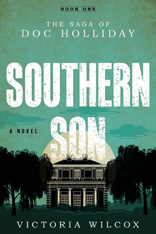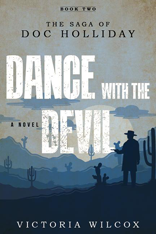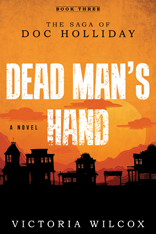Although John Henry “Doc” Holliday grew up in Georgia during the Civil War as the son of a Confederate officer, the closest he got to the action himself was seeing troops marching through his hometown of Griffin, location of two Confederate training camps. When his father returned home early from the war on a medical discharge, the family left Griffin and moved south to the little village of Valdosta, close by the Florida border and far from the advancing Yankee army. But other members of the family had a much closer view of the war, and their stories became part of his childhood memories – like the story of his Uncle Robert Kennedy Holliday (father of Cousin Mattie) who served under General Longstreet at Gettysburg, and Rob’s wife, Aunt Mary Anne Fitzgerald Holliday, who was home with the children in Jonesboro when Sherman’s Army marched south from Atlanta. With an army approaching and the road “filled with bluecoats,” Mary Anne took her children away to her uncle’s plantation for safety. The following comes from Mattie in her “Memoirs of the Holliday Family in Georgia”:

Phillip Fitzgerald’s home, south of Jonesboro, was the model for “Tara” in Gone With the Wind – Phillip was great-grandfather to author Margaret Mitchell.
“Finding it was probable a battle would be fought in Jonesboro, she [Mary Anne] at the solicitation of her Uncle Phillip Fitzgerald went with her family August 30 to his farm, four miles out of Jonesboro, and remained two weeks. Returning they found only the frame work of their home standing. It had furnished timber for breastworks.”
And there was something else changed about their home: there were two fresh graves in the yard behind the house. This account comes from Joseph Henry Hightower Moore in his History of Clayton County:

Mattie Holliday’s family home was taken apart for timber to build breastworks for the Battle of Atlanta.
“When the Battle of Jonesboro was fought, August 31 – September 1, 1864, an incident occurred which subsequently involved Mrs. Robert K. Holliday and her oldest daughter, Miss Martha Holliday [Mattie]… During the first day of the battle, Colonel William Grace, commander of the 10th Tennessee Regiment, C.S.A., received a mortal wound. His troops moved him to what seemed a relatively safe location behind the lines of the heaviest fighting, and there he was ministered to by the Chaplain of the 10th Tennessee Regiment…Father Emmeran Bliemel of the Order of St. Benedict. As Father Bliemel was in the process of giving the last rites of the Church to his wounded commander, he was himself struck by a shell and instantly killed. When Colonel Grace died shortly after, both his body and that of Father Bliemel were moved to a grove of trees in Jonesboro, and there, side by side, they received temporary burial… in the garden of the Holliday home.

Father Bleimal is honored with a display in the Civil War room at the Road to Tara Museum in Jonesboro. It’s a fitting memorial for a man whose grave was in the garden of the home of a family related to “Gone With the Wind.”
Mrs. Holliday and her children saw that the graves were marked for identification and proceeded to care for the grave sites until the remains of the two men were moved to the…Memorial Cemetery on the north side of town…Mrs. Holliday arranged for Father Thomas O’Reilly of the Shrine of the Immaculate Conception in Atlanta to come to Jonesboro and perform a proper Catholic burial for them. The Hollidays continued to care for the graves, in their new location, until Captain Holliday’s death in 1872, when Mrs. Holliday and her family moved to Atlanta.”
After the battle, Aunt Mary Anne took her children away from ravaged Jonesboro to the South Georgia farm of her brother-in-law, Henry Holliday – Doc’s father. That story is also told by Mattie in her later memoirs:
“Although the times were lawless, God watched over the little family and rewarded the confidence of mother. Times were hard, food very scarce, but He saw they never went hungry. At the expiration of two weeks, they got to Gordon, 40 miles below Macon. Here, they had to leave the [rail]car and wait two weeks for one to take them father south. In all the stops and waiting, unexpected friends met and helped to make them as comfortable as was in their power. And so at the end of a long and tiresome journey of several hundred miles, they reached Valdosta, Georgia, and the car stopped. There stood H.B. Holliday, her brother-in-law, hitching his horse to a rack. Her destination was his farm seven miles out of town. He did not know of her coming. She had no means of communication, but God in whom she trusted arranged for her here as in every other circumstance of that eventful journey. This good brother took the family to his home, gave them a house on his farm and provided for them till his brother returned after the surrender, May 24, 1865.”
John Henry was there, of course, a young teenager far from his own hometown in a time of war, but now his cousins had come to stay awhile. And when the war ended and they returned home and he got into some trouble of his own, he was sent north to Jonesboro to spend a summer with Mattie’s family there. And he certainly would have learned from Mattie and her family about the graves in their garden, and likely even saw them for himself. So although the War was far away for young Doc Holliday, it was also as close as his cousin’s backyard, and their stories became part of his own family history.
Having learned the importance of family during the hard times of Civil War and Reconstruction, it’s no wonder Doc Holliday developed a deep loyalty for his new “family” in the West – Wyatt Earp and his brothers – and stood by them in times of trouble. That’s just what family does.
Fun Links
Road to Tara Museum
Father Emmeran Bliemal
Map of Battle of Jonesboro
Video – Atlanta Campaign: Battle of Jonesboro
Battle of Jonesboro 150th Anniversary
Click the book cover below for more info or to order.
